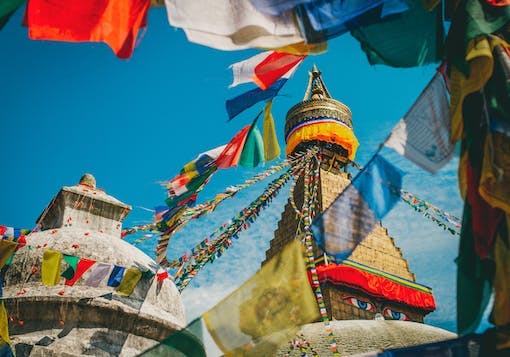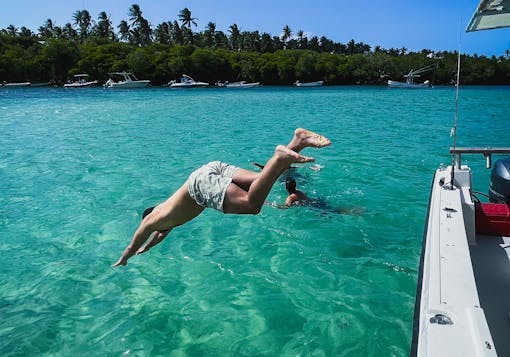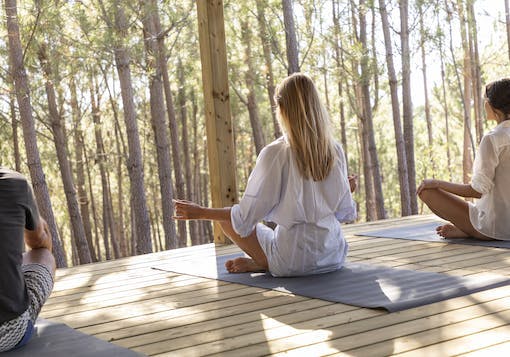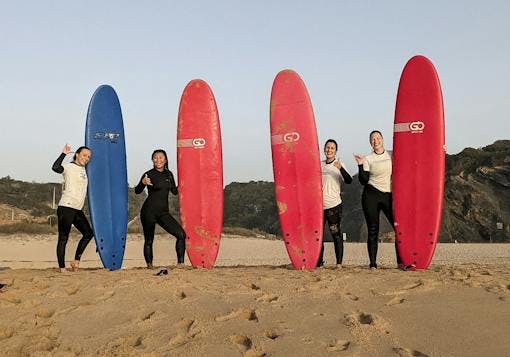Travel Trends 2023: New Sustainable Changes?

31
Jan
Travel Trends 2023: New Sustainable Changes?
The beginning of the year for the travel industry is usually when all attention shifts towards the future, attempting to predict – to the best of experts’ ability – what the travel demand will be in the months ahead in 2023 and how that demand will be shaped by travel trends.
We will look backwards, but only to briefly capture some of the new fashions that might have marked the scene, and which show strong signs of a long stay.
Moreover, looking backwards can help us better shape the year ahead by understanding what happened and why. This knowledge can guide us in making better and more conscious choices for the planet and its inhabitants.
If some of the travel trends that started last year continue into the next one, we hope they will strengthen the movement of positive change ignited within the tourism sector.
The Concept of Sustainability
Sustainability is a complex concept with cultural, social, environmental, and economic dimensions. The word ‘sustainability’ refers to a balanced development model and was first defined in 1987 by the United Nations Brundtland Commission in their “Our common future” report:
Sustainability aims to meet the needs of the present without compromising the ability of future generations to meet their own needs.
However, given that the adjective ‘sustainable’ is becoming the new regular companion of the word ‘travel,’ a good starting point would be to become aware – as the mindful responsible travelers we strive to be – of the deeper meaning of the term. This will empower us to ask the right questions with increased knowledge and awareness.
According to the UNTWO, sustainable tourism is:
Tourism that takes full account of its current and future economic, social and environmental impacts, addressing the needs of visitors, the industry, the environment, and host communities.
Let’s keep this holistic picture in mind when we refer to ‘sustainability.’ It is more of an ideal steady state than something we achieve once and for all. Therefore, we should consider it more as a journey than a destination. In this environment of continuous improvement, positive results can only come when all stakeholders participate in moving toward a common direction.
- The travel and tourism industry is becoming more aware and responsible.
- Governments are incentivizing and supporting habit changes.
- Responsible travelers are demanding transparency and inspiring innovation by providing feedback and asking probing questions.
All stakeholders have significant roles to play.
A Change in Language
The first and more obvious sign of change is in the language we use to discuss travel and tourism. Let’s have a look at how this has been evolving.
The word ‘sustainability’ has enjoyed increased popularity. ‘Sustainability’ is constantly popping up on websites, newsletters, and social media posts. However, it doesn’t always go beyond a lot of good intentions.
If the industry feels the need to keep up with the sustainability agenda, it’s because there is a real need for it. We are shown this regularly through abundant social and scientific evidence about climate change, diversity, equality, and inclusion. We cannot ignore the demand for increased environmental protection, cultural conservation, human empowerment, and sustainable development.
Sometimes, this newfound ‘gusto’ for advancing the sustainability agenda comes from external pressure points, such as:
- New industry regulations
- Governments demanding commitment
- Investors
- Consumers
Regardless of the shift’s source, the change in the perspective and mindset is ultimately entering the industry for good.
Education comes in different forms, doesn’t it?
Trend #1: An increasing number of stakeholders are joining the movement to create a more sustainable tourism industry.
Rediscovering Culture
Expedia’s “The No-Normal Travel-Trend” report and Booking’s “The creative reimagination of travel” report highlight a new interest in culture. However, culture comes in different forms and can be experienced in incredibly diverse environments.
The latest Booking report discusses new strong desires to experience ‘out of comfort zone’ travel. This sentiment echoed across all 32 countries from which respondents reported. On average, 73% of respondents want these limit-pushing adventures. This number spikes to over 90% for respondents in India, Thailand, and China.
Traveling triggers feelings of curiosity and an openness to the world. For more than half of the respondents (51%), this means experiencing places with vastly different cultures and languages. Thirty percent of respondents are “keen to explore lesser-known cities with hidden gems that aren’t already on the radar,” and 50% openly expressed that they want to “experience complete cultural shock” on future trips.
Trend #2: Travelers want to be immersed in the culture of destinations, even – or perhaps, especially – if that means venturing outside their comfort zone.
Set-Jetting
The new set-jetting travel trend – mentioned by Condé Nast Traveller, among others – is believed to be a strong one in 2023. Not to be confused with ‘jet-setting,’ set-jetting influences travel decisions by motivating people to visit destinations they have become familiar with through their screens. See ‘The Emily in Paris‘ effect as one clear-cut example. After being trapped on our couches for so long, TV streaming habits are encouraging travelers to get off their couches and out into the world more than ever.
In a way, set-jetting helps the cultural discovery of a place. We have traveled virtually through TVs and iPads, getting to know different locations and learning about new lifestyles and old history and traditions. However, there comes a moment we need to abandon the two-dimensional reality and fully embrace the critical third and fourth dimensions by visiting in person. This will undoubtedly enrich our exposure to an already-familiar place by experiencing it with more awareness and enjoyment.
Traveling to locations virtually before in-person can create more conscious travelers because we have already absorbed part of its culture and lifestyle. Because of this, we might be more responsible when experiencing it in person. Alternatively, we might turn completely blind, only in search of the images that attracted us to the destination in the first place.
Trend #3: As set-jetting influences where travelers go, it’s up to us to use the increased virtual exposure of places to visit them with even more care.
Indigenous Tourism
A separate cultural movement has been gaining momentum, which is a rise in the popularity of indigenous tourism globally. More native communities worldwide are taking the lead in their tourism offers. Indigenous people are starting to design, develop, and manage high-quality tours and experiences.
We warmly welcome this healthy surge of Community-Based Tourism (CBT) experiences because we believe they are critical to the sustainable development of tourism activities. By embarking on a CBT experience, travelers will learn from the local ancestral knowledge and about the regenerative relationship travelers and locals have with the natural environment.
Visitors will also have the chance to leave a positive footprint on the destination by directly supporting local businesses. Above all, visitors can contribute to preserving cultural traditions, many of which should be considered a world heritage.
Trend #4: This is the time to experience ancestral knowledge in the safe environment of a tourism experience directly from indigenous people as our hosts and guides. Be open to the unknown and enjoy – you will learn more about our planet as well.
New Sustainable Travel Trends
Here are some interesting travel behaviors that demonstrate some types of unique experiences travelers are demanding.
Wellness Plus
The concept of wellness has been changing and is taking an inward direction.
The idea of using a holiday as the moment to unplug from the heavy and noisy routine is not new. However, the novelty is that more experiences offer personal transformation and a deeper connection with your inner self.
Traditional psychedelic trips are trending up as a path to elevated spiritual experiences, Booking reports. These experiences can also be meditation and mindfulness getaways.
According to Condé Nast Traveller’s experts, retreats nowadays offer dance therapy, chakra courses, and self-awareness group sessions. Some experiences include exploring new food and superfood, like the so-called ‘adaptogenic’ food – plants and mushrooms that strengthen the body to cope with stress, anxiety, and fatigue.
In general, trips offering personal transformation and a deeper connection with the world are on the rise. The goal of such experiences is for the participants to ‘become better individuals.’ These unique itineraries target tourists looking for more intense and meaningful encounters for their minds and souls, perhaps facilitated by the natural surroundings.
Yoga retreats are also innovating the practice and responding to the multiple needs that guests might have. At one such yoga retreat in Portugal, the retreat center prides itself on providing great yoga in a lighthearted environment. Yogis of all levels come to relax, try new poses, and – importantly – sip a glass of locally produced wine each evening after a fulfilling day.
Conscientious travelers can also combine restoring their internal balance with their external willingness to contribute to the sustainable development of a region. For example, you can learn to surf in the Atlantic ocean while supporting Portugal in the shoulder season while staying at a rural, eco-friendly resort.
Trend #5: The concept of wellness is changing and will continue to combine elements of self-transformation, both for the body and the mind, in search of a deeper connection with nature.
Luxury Revisited
Our perception of luxury is also changing.
The demand for luxury travel is shifting towards younger demographics, showing that the new generations are more prone to save money and invest in quality over quantity.
Booking’s latest report confirms the shift in younger travelers seeking luxury trips. The report shares that 49% of their survey participants plan to be more indulgent in their spending habits while on holiday, and 43% plan to spend lavishly to ensure they maximize their experience.
Beyond luxury huts and glamping experiences in the wildness, luxury can also mean simply combining nature-focused trips with luxury elements. One example is upgrading safari accommodations from camping to upscale lodges, following a rewarding trekking experience of Mt. Kilimanjaro.
Trend #6: Luxury is a growing demand, even for younger generations, and it reflects a shift in preferences where quality wins over quantity.
Nomadic Lifestyles
Many countries have started offering incentives and long-term visas to people willing to live and work in another country for at least a year.
This trend might only get stronger as time goes on with an increasing number of countries starting to offer the opportunity to foreign visitors.
- Spain is one of them. From this January, it is possible to apply for its new Digital Nomad Visa. This visa will allow people to stay and work for one year with the possibility to extend it for an additional four.
- Italy is another. In March 2022, a law approved offering a 12-month, renewable visa. However, the details have not been disclosed yet.
European countries are not the only ones experimenting with this type of opportunity. Many attractive destinations, such as countries within the Caribbean Islands, have similar programs for individuals and families.
Last year, countries from Latin America, such as Ecuador and Brazil, and countries from South East Asia, such as Thailand and Malaysia, joined the long list of nations from which digital nomads can relocate and work remotely.
However, you don’t need to be a full-time digital nomad to experience this lifestyle.
Forbes detects the raising of what it calls ‘hush’ trips, a two-to-three week trip – strictly not shared with the employer – that allows remote workers to enjoy the flexibility of their work schedule far from their bland desk at home.
Accommodations and traditional properties are already offering discounts on extended stays.
Trend #7: More flexible working modes have become a new reality and it is now possible for remote workers to take advantage of long-term visas from an increasing number of countries globally.
Coming Back to the Essence of Travel
We hope that the compulsive instinct to go on holiday evolves into a more thoughtful way of traveling.
What these seven travel ‘trends’ just presented seem to have in common is a search for something more profound. We hope they continue contributing to the sustainable tourism movement towards more mindful, unique, and immersive travel experiences.
Connecting with ourselves, soaking in natural surroundings, and learning about the local culture represent new reasons why we travel. The focal point seems to be a desire for inner transformation and meaningful connections.
We believe that, as travelers, we are aware now more than ever that tourism always produces impacts. We are determined to guarantee that, with our explorations of the world, we only contribute to the positive impacts.
At Yugen Earthside, we want to start this promising year of travels with the consciousness that tourism is an essential element of our lives; and remind ourselves and others that tourism can also play a crucial role in the future of our planet.
Happy mindful traveling!








